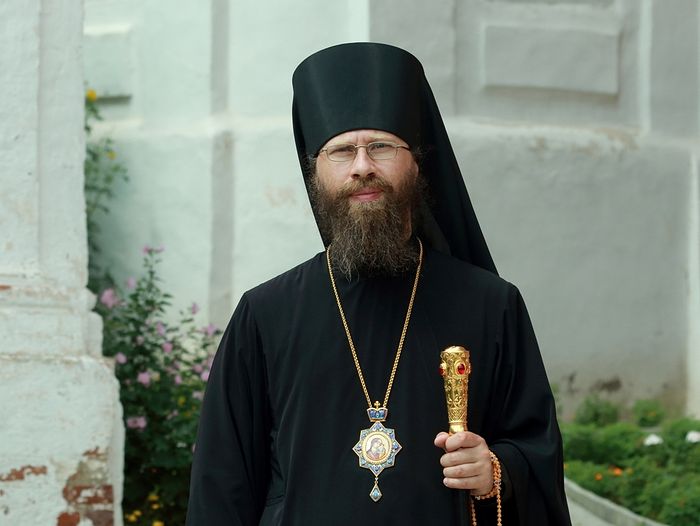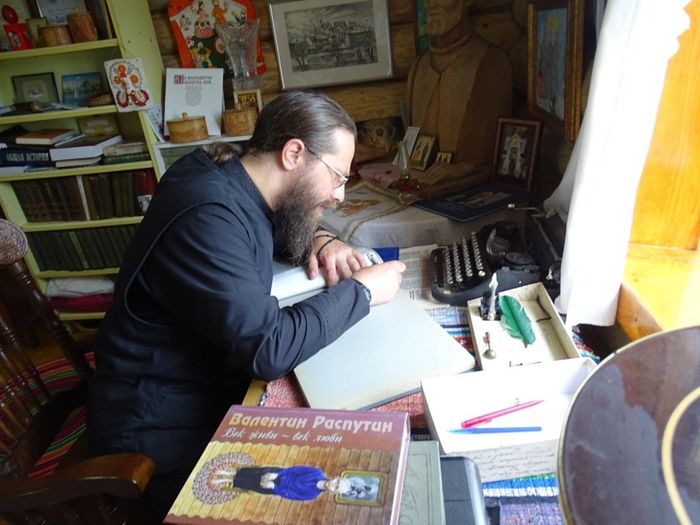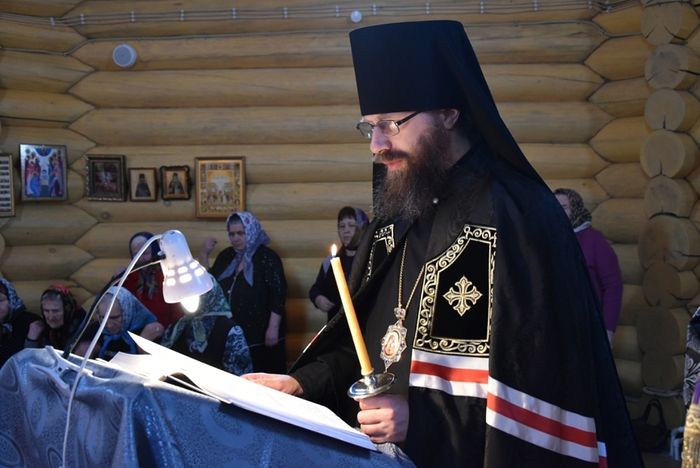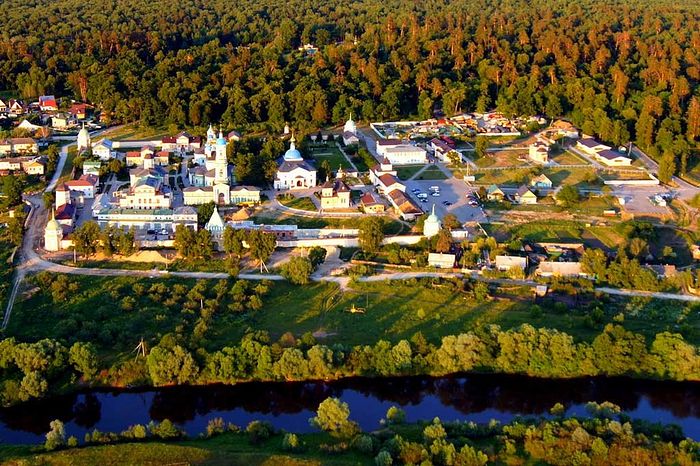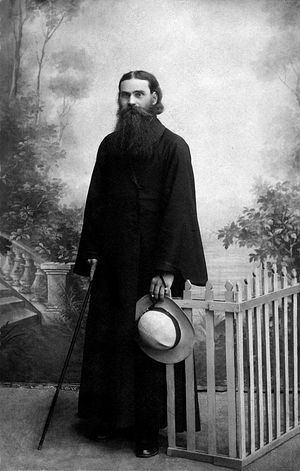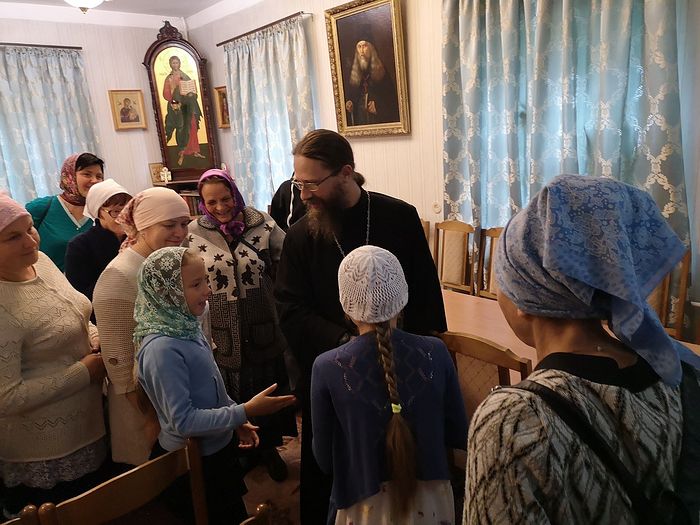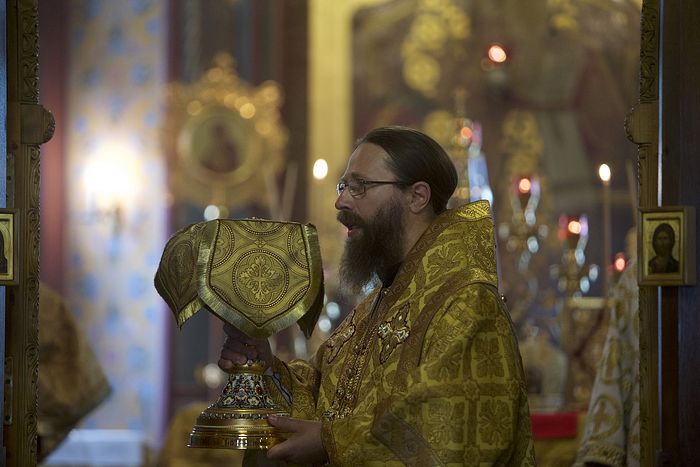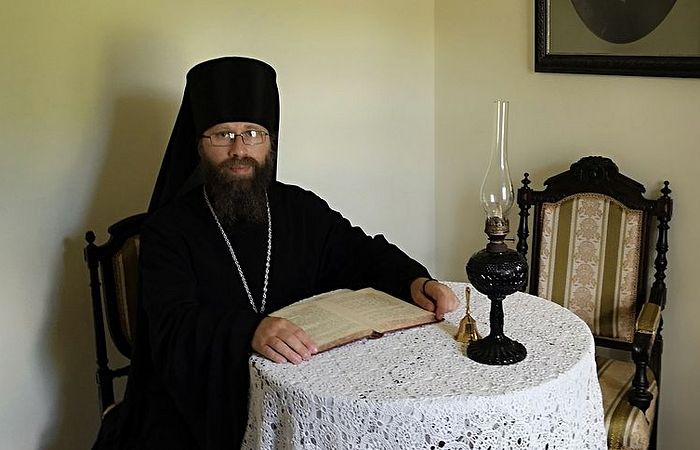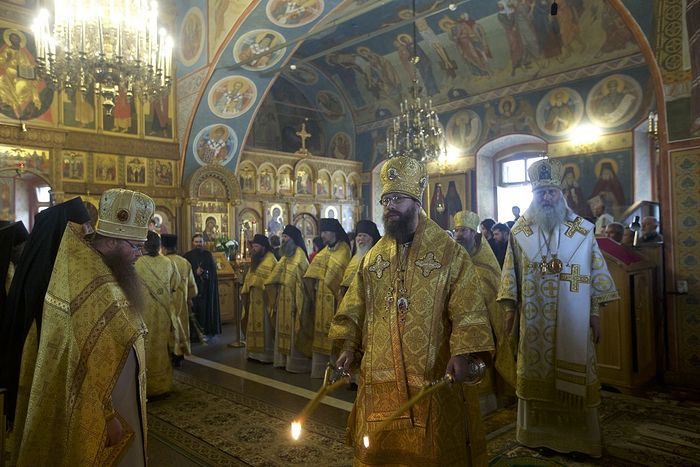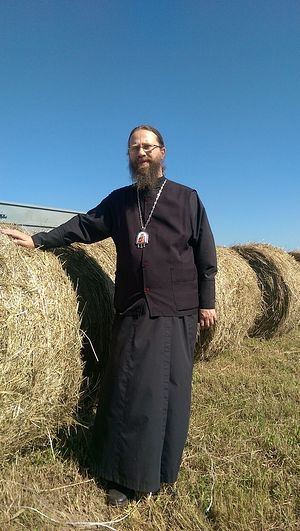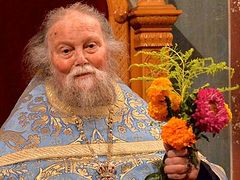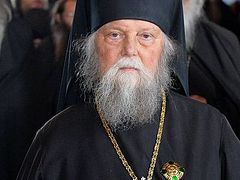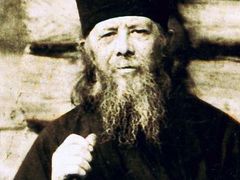Crows cawing, persistently and loudly, meet us with Vladyka as soon as we get to the closed brothers’ part of the monastery. I lament that you can’t get a good recording with such a hubbub: Presumably we’ll be recording the conversation on camera. The abbot responds straight away: “We have some problems from these birds! They eat our apples,” the bishop says, genuine anxiety heard in his voice. “When I was in charge of the garden here, we had to stretch nets across the trees.” I note for myself that I want to ask about obediences in the garden, but for now I’m looking around: cobblestones, old buildings, flourished lanterns. It’s like a picture from old books. A light breeze slips by below my shirt. “Vladyka, do you still quiver when you walk along these paths?” “I feel only responsibility now,” he responds without hesitation, “because it’s a heavy load for me.” The Then he tells us a candid story: “There are times when I forget that I’m the abbot. I remember when I was here just as a monk. Not long ago, people were waiting for me in the office; I went there and I thought, “Why is the abbot calling me? Then a little time passed and I thought, ‘And now I’m the abbot here myself!’”
We finally reach the plum orchard, and we decide to stop there to record the conversation. в Карман
—Vladyka, I read in previous interviews that only your grandmother was a believer in your family. Was she the one that brought you to the Church?
—Indeed, my grandmother was a believer her whole life. She came from a simple family; she lived through the Leningrad Blockade as a young girl. She often told me about that terrible time and how they still got out of the city along Lake Ladoga. My parents took my brother and I to our grandmother’s in the village every summer, in the Lipetsk Province. She took us to church regularly there. I must admit, I didn’t really agree to this, and there were even times when I resisted. I read a lot of atheist literature in school.
—And who were your parents? You didn’t speak about the Church with them?
—My father worked in the Moscow subway and my mother was an engineer—she’s a native of the Ryazan Province. My family weren’t believers except for my grandmother. She always prayed, including for lunch and dinner. We had a farm in the village, and she didn’t even allow us to gather hay on the Great Feasts; she didn’t allow us to work and was very strict about it. I’ll tell you something I don’t usually say but which is important for me: My ordination as a deacon after my tonsure as a monk fell on the fortieth day of my grandmother’s repose.
—After school you entered the Timiryazev Russian State Agricultural University. How did your future look then?
—I probably felt some kind of pull towards the animal world thanks to village life. Also, I had classes with a chemistry-biological slant. We also had a practicum in school at the All-Union Research Institute of Selection and Seed Production of Vegetable Cultivation. I liked going there and I wanted to do research related to plants in the future. That’s why I chose the Timiryazev Academy.
—But, in the end, the first year turned out to be connected with a more conscious coming to the Church than in childhood. How did that begin?
—That was in 1993. It was due to events connected with the murdered brothers of Optina Monastery. I even remember that day. We were in the cafeteria having breakfast and someone told me that three monks had been killed at Optina Monastery. For some reason that really stayed with me. Then my brother, who’s now a priest, started going to church, and I started taking books from him. I was especially struck by the works of Sergei Nilus where he describes Optina and the life of the elders.
—How could his works strike a first-year student of a secular university?
—There are these stories there—not just formulaic biographies—with such moments in life that cannot be captured anywhere, but in them is seen the providence of God. It really impressed me, of course, and later, when I started going to church, in 1994 or 1995, I took my first trip from the parish to Optina Monastery. I remember, we spent the night in the Vladimir gate tower, on the wooden floor. There was Liturgy in the morning, and then was my first time in the St. Paphnuty of Borovsk spring—it was the first submersion in my life in general. It was winter, there was severe frost, but I endured it calmly, and the impression stayed with me for a long time. And again, on another trip, we had Liturgy in the skete since they were still allowing parishioners to go to the services there. There were a lot of people and it was incredibly stuffy.
—Do you remember the turning point, when you said to yourself, “Now I am only with the Church?”
—During the period when I had begun to read the books of Sergei Nilus, I again went to the village. We had a pious babushka living with us there, and she gave me then the Kiev Caves Paterikon. I read it, and it seemed to me that fully fulfilling the Gospel commandments is possible only in monasticism. From that moment I decided to follow the monastic path. There were of course some delays later—I had to finish the institute. Then I went to the Perervsinsky Seminary.[1] But I had already firmly decided by then that the monastic path was for me.
—It’s one thing to read and admire it, but it’s another matter altogether to really get tonsured. How did it happen that you became a monk of Optina?
—I believe it was God’s providence: It wasn’t so much that I chose this monastery as much as it was that the providence of God sent me here. When I was at home and didn’t know where to go, I called a friend who helped me work in the archives writing on the history of the Perervinsky Seminary (I wrote many articles about it). This friend got me in touch with Fr. Athanasy, who was the head of Optina’s publishing department then. Hieromonk Athanasy is still here, working at another obedience. He proposed gathering information about the monastery in the archives in St. Petersburg, so I went. It was April 2002, and I spent a month gathering information at the St. Petersburg podvoriye on Vasilevsky Island. I came to Optina on May 1, 2002 and remained here permanently. I continued working on the history and publishing books.
—So you were one of the ones who recovered the history of the monastery?
—Well, I wouldn’t say that! There was some material that I found that no one knew about, I could say. Then the abbot, the reposed Fr. Benedict, put me on an obedience not connected with the publishing works or the archives. I wound up at the subsidiary farm because I had the necessary education—I spent probably ten years there. I did practically all the obediences: the stables, the chicken coop, in the gardens; I was even a machine operator one winter. I was the dean and the head of the subsidiary farm for a while.
“It’s a big problem that the youth have no ideals”
—They say you were nearly sent to Kamchatka, but in the end, you wound up in St. Petersburg, at the same podvoriye on Vasilevsky Island.
—It’s probably better to say again: Divine providence led me. I wasn’t planning to leave the monastery at all, I wasn’t raring to go anywhere, but I didn’t oppose the bishop’s decision. When they put Vladyka Artemy in the Kamchatka Diocese, he had a plan to take three monks from Optina and Valaam to be missionaries in Kamchatka. The abbot offered it to me—I didn’t refuse, but he later rethought it. From that moment, I understood that I have to fulfill the bishop’s will, not resist it, and after that I wound up at the podvoriye in St. Petersburg. I spent a year there, doing parish ministry, and this activity taught me a lot and prepared me for work in the diocese, because if I had gone immediately from the monastery to the diocese, it would have been much harder for me.
—Speaking of the diocese—you were in Vyatka, and your path again crossed with Optina…
—In our Urzhum Diocese there was the so-called Vyatlag: Those places where they put imprisoned confessors for the Orthodox faith. There was an Optina monk there—the Venerable Confessor Hieromonk Raphael (Sheichenko); he served the last six years of his twenty-year imprisonment in Vyatlag. He connected me with my home monastery.
—Why do most of our people remain indifferent to the topic of the New Martyrs?
—In the modern world, people don’t want to follow any example—they want to live more passively, and more sluggishly, so to speak. It’s very difficult to follow an example; you have to always be tense, always be in a fighting mood, in good shape, and, of course, when people are given to read the lives of the New Martyrs, they don’t like it. What do they like? Hagiographies that have lots of miracles and lots of prophecies of an elder. They read and they admire, but they don’t receive any benefit from it, because the main benefit from hagiographies is when someone not only reads and delights in what he has read, but also tries to follow the example of the person he has read about. People nowadays don’t want to change themselves, but you have to change yourself—that’s what’s important.
—These words are especially true of the youth…
—It’s a big problem that the youth have no ideals, no desire for any kind of podvig, and it’s very important that modern youth have no desire to take any responsibility upon themselves. Speaking of the diocese, sometimes you put a priest in a parish, and he doesn’t want to do anything special. He celebrates the services, celebrates the necessary molebens, panikhidas, Baptisms, weddings, and so on, but he doesn’t especially want to work with the parishioners; he has no initiative or responsibility. It didn’t use to be this way. I look at my peers: No matter what assignment was given, they tried to fulfill it. Now it’s, “Sorry, it didn’t work out,” or “I got sick,” or “I can’t.” And that’s it. And he promptly retires. And maybe he doesn’t want to do anything at all.
—Returning to Optina, how did your appointment as abbot come about?
—I had a premonition, and there were signs that led me to it, but still, I was in shock when I heard the Holy Synod’s decision, but I accepted it. I have long been accustomed to living by obedience, so I didn’t resist the hierarchs’ decision.
“I’ve also had disappointments”
—Have you already had time to figure out what issues you’re faced with here and how you’ll resolve them?
—There are internal problems that I’m not going to talk about, but I have to face them… I’m going to continue what the reposed abbot Archimandrite Benedict was doing. We will try to make sure that the people who come to the monastery (most of them pilgrims) don’t leave without nourishment, that they are received, accommodated, and leave with spiritual benefit and a good impression of our monastery. Perhaps they will spread this impression and speak about the monastery as about the entire Church, because the example of our monasteries is a valuable example that shows that the Russian Orthodox Church is holding on, and that the media is reporting falsehoods.
—The media is saying for example that many are leaving the Church today. If you compare it with the 1990s, then now it’s just an exodus. How can this be explained?
—We didn’t have this continuity where parents took their children to Church, and they didn’t show us how to go to church, how to live a Church life, how to live in a marriage. Having read some books, the people wanted to see an ideal Church, but the reality was hard for them. Some of them set a bar in their expectations that was impossible to meet in reality. What can we do now? Just have a realistic attitude towards life and try to find a priest, a spiritual father who will explain and interpret the rules of the Church for our lives—not slacken them—out of the question!—but just explain how we must fulfill them without overstraining ourselves.
—Many monastics also leave the Church…
—When I was in the diocese, the media had these so-called confessions of “former monastics.” I read a few of them—not all of them, because they were hard to read. They were written by people who are offended by everything—by the clergy they’d encountered, and by God. But I saw in these confessions that the person himself had messed up. He mainly just idealized the path he’d chosen; he didn’t understand what he’d gotten into. There was no sober, reasonable approach, evaluation, or perception.
—Vladyka, you also read books and probably idealized something, and were probably disappointed in something, but you stayed…
—Yes, I also had some disappointments, especially when I was faced with service in the diocese. The priests that were there weren’t monks or ascetics—they were more secular, more immersed in their own affairs and family concerns. I still tried to keep that example I had in the monastery and not pay attention to the fact that there exists a more loyal attitude to the rules and the Gospel commandments.
—Are there more brothers at Optina now?
—There are 200, including the novices, but this is thanks to Fr. Benedict—there were 150 people here in 2013, and during the five years that I was gone, the brotherhood increased by about fifty people.
—Will you take everyone?
—No, you know, many people come to the monastery, and there’s a choice; and we have a strict attitude towards those that come. I remember, they ordained me after a year—I had an education—but others have been held for a long time. There have been periods when we didn’t have any hieromonk ordinations for two or three years. The abbot was very strict. That is how it should be! You asked why people leave the monastery—it’s connected with the fact that they had only a brief period of testing. That’s not how it is with us…
—Is it possible that Optina will become famous again as the home of elders in the near future?
—I’ll say this: In the nineteenth century, those people we now consider elders were not perceived as such by everyone. Some people listened to one elder and criticized another, although they lived together in one monastery at the same time. That is, a monk becomes an elder for someone because he became an authority for him, and the person listens to him and follows his instructions. There are such people now too. Do you know how the reposed Archimandrite John (Krestiankin) would joke when people came to see him at Pskov Caves Monastery? People would come to him and ask where it was possible to find some elders? He responded: “The elders are lying in the caves, but here there’s only the elderly!” A man himself determines who is an elder for him, and who is not an elder.
Why do people go to elders and spiritual fathers today? The majority—I’m not saying everyone, but many—go to receive a revelation about their lives, their futures. They might receive one, but will they follow it? We can cite the apostle Paul as an example. Why did the Lord appear to him when He was struck blind? Because the Lord knew that he (still Saul at the time) would change. Thus, sometimes, elders don’t respond to people because they won’t change. The Lord does not reveal it to them, so that they won’t be more condemned at the Dread Judgment.

